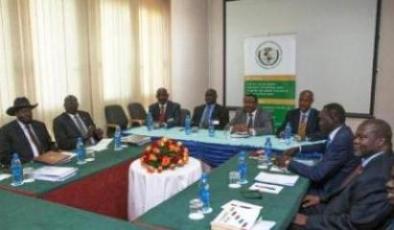S. Sudan president in Addis Ababa for talks with rebel leader
August 16, 2015 (ADDIS ABABA) – South Sudanese president, Salva Kiir is in the Ethiopian capital, Addis Ababa, for direct talks on a possible peace deal with rebel leader, Riek Machar, despite his government’s earlier utterances that he would not travel to the venue of the negotiations.

On Friday Juba announced that president Kiir would not travel to Addis Ababa for the negotiations, hinting that he would only delegate his deputy, James Wani Igga, to do the talking while threatening to call back to Juba their peace delegation. An alleged split within the opposition camp was said to be the reason for the initial decision of non-participation of the president.
Sources close to the talks attributed the last minute change of mind by president to travel to Addis Ababa to the demand by the regional and international mediators of IGAD-Plus that the South Sudanese head of state must show up to face the rebel leader and resolve contentious issues stalling the peace process.
However, before to leave Juba, Kiir expressed hope that he can reach a viable peace agreement and warned it will not be possible to sign a deal unless all the rebel factions join it.
“A peace that cannot be sustained cannot be signed,” he said.
“You should sign something that you will enjoy. If it is signed today and then tomorrow we go back to war, then what have we achieved?” The president added.
President Kiir was expected to immediately begin the face-to-face negotiations in the evening of Sunday with the armed opposition leader, Machar, after receiving briefings from his chief negotiator, Nhial Deng Nhial, and IGAD-Plus chief mediator, Seyoum Mesfin.
The source further explained that IGAD-Plus urged the two principal leaders to prepare for the signing of the peace agreement on Monday, adding that the initial IGAD-Plus peace compromise proposal of 24 July in Addis Ababa will be used as the basis for the negotiations and not the recent revised version of 10 August produced in Kampala, Uganda.
IGAD-Plus issued a statement on Saturday saying the deadline to sign the final peace agreement remained the 17 August, stressing that it will not be extended.
“We, the members of IGAD PLUS, have gathered in Addis Ababa as planned for consultations on August 15-?16, and the IGAD PLUS Summit on August 17. We affirm our collective commitment to this process, and to the established timeline. We expect the parties to be represented in Addis Ababa by their principals, in order to negotiate in good faith and sign anagreementon17th of August 2015,” reads the statement extended to Sudan Tribune on Saturday.
Rebels protested against what they said was a “shift’ in Kampala from the IGAD-Plus proposal of 24 July on which basis the two parties consulted on with their respective constituencies.
However, the revised version in Kampala removed the clause which provides for a power sharing ratio if three states of the oil-rich greater Upper Nile region which gives the rebel faction 53%, government, 33% and former detainees plus political parties, 14%.
It also removed the clause which states that the national capital, Juba, will be demilitarized and foreign forces deployed within a radius of 25kms in the capital for a duration of 30 months of transitional period.
Regional heads of state and government and representatives of the African Union (AU), Troika countries (United States, United Kingdom and Norway), European Union (EU), China and the United Nations (UN) have started to arrive in Addis Ababa on Sunday for the preparation of the Monday signing ceremony.
IGAD heads of state and government are also expected to hold their 17th regional summit on Monday before the expected signing event.
United Nations has warned of sanctions against a party that will refuse to sign the deal.
(ST)
